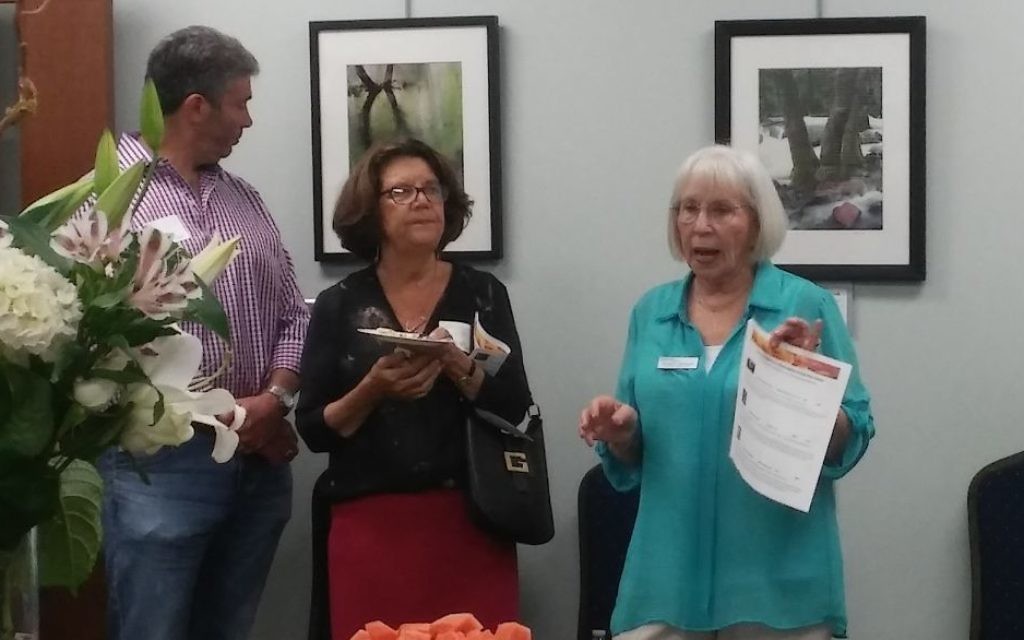MACoM Expands Sense of Place
With its financial position secure, the community mikvah is deepening its connections across Jewish Atlanta.

“This has been a great year,” Metro Atlanta Community Mikvah President Caryn Hanrahan said in opening MACoM’s second annual meeting Sunday, June 11.
She wasn’t exaggerating.
The first MACoM gala at the Georgia Aquarium in March ensured that the year was a financial success. Executive Director Barbara LeNoble said the celebration of Rabbis Alvin Sugarman and Joshua Heller brought in $350,000 and had expenses of less than $41,000 — about 12 percent of the money raised, compared with the 35 percent that’s typical for such events.
Get The AJT Newsletter by email and never miss our top stories Free Sign Up
That frugality fits with MACoM’s regular operations. It has kept a tight rein on costs, spending $9,500 a month vs. a budget of $10,200, outgoing Treasurer Michael Weiser said.
He said the gala not only will enable MACoM to pay off its mortgage by June 30, the end of the fiscal year, but also will provide a financial cushion to take the pressure off fundraising for at least a couple of years. The hope, he said, is to keep carrying that surplus indefinitely.
A board of as many as 11 nonvoting advisers, each contributing at least $1,000 to the mikvah and led by Mike Leven, will help MACoM keep meeting its financial goals (even though the average donation of people dipping in the mikvah is less than projected).
But the mikvah isn’t about money; it’s about the service it provides the community, from Orthodox to secular and every variation of Jewish practice in between.
“MACoM is all about community,” said SOJOURN Executive Director Rebecca Stapel-Wax, an outgoing board member. She emphasized the nonprofit organization’s focus on partnerships, reflected in the range of board members and their role as ambassadors for the mikvah.
The mikvah also has a board of clergy representing 10 synagogues and other organizations. Rabbi Heller said the clergy members’ primary responsibility is ensuring that the waters are kosher for all uses, but being a community mikvah can create complications, from gender questions to the fundamental issue of who may use the facility on Congregation B’nai Torah’s Sandy Springs campus.
Not surprisingly, no Orthodox rabbi is on the MACoM clergy board. But the mikvah has Orthodox support and consults with Orthodox rabbis to ensure it meets the needs of that portion of the community, Rabbi Heller said.
MACoM, born as a partnership of synagogues interested in creating a place for the modern and traditional uses of immersion, works with groups such as the Atlanta Rabbinical Association, HAMSA, InterfaithFamily/Atlanta and SOJOURN and co-sponsored Ahavath Achim Synagogue’s Shavuot study program at the end of May (along with the AJT).
Those partnerships enhance MACoM’s educational programs, including a Rosh Chodesh group, holiday events, and tours for adult and youth groups. Since January 2015, LeNoble said, MACoM has hosted 55 events attracting 857 visitors.
Its community room serves as a meeting place for outside organizations, from Jewish National Fund to the Jewish Fertility Foundation to the Women of Weber.
Now MACoM also serves as a gallery for Jewish artists, starting with “Mayim Rabim,” Sandy Springs photographer Margery Diamond’s exhibit of water-related pieces displayed through three rooms. The art is for sale, and MACoM gets a donation of a portion of the proceeds.
The community mikvah is another way that Atlanta exemplifies Jewish innovation. Board member Leah Blum said MACoM is one of five such facilities forming a national network that is sure to grow. All the congregations in New Orleans and Baton Rouge, for example, have plans to install a community mikvah on the grounds of a Conservative synagogue in Metairie.
MACoM is here to stay, and the whole community is better for it.




comments